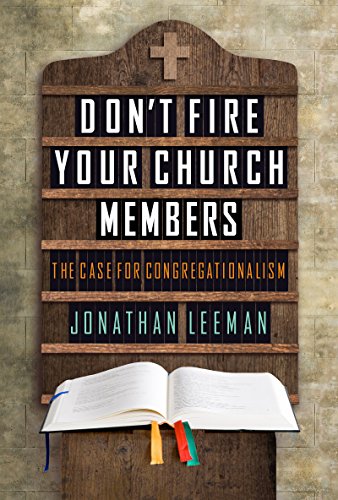Don't Fire Your Church Members
The Case for Congregationalism
Jonathan Leeman
BOOK REVIEW

In a world where church governance often feels like a labyrinthine mess, Jonathan Leeman's Don't Fire Your Church Members: The Case for Congregationalism offers a refreshing and thought-provoking perspective. This book is not merely a manual; it's a powerful manifesto advocating for congregationalism, a model in which church members possess both authority and responsibility. As you turn the pages, you find yourself pulled into a deeper understanding of church dynamics and community commitment.
Leeman invites us, almost provocatively, to reconsider the often-troubling notion of church leadership. The heart of his argument posits that congregationalism is not just preferable but essential for the health and vibrancy of the church. He paints a compelling picture where every voice matters, each member's input is irreplaceable, and the church thrives not under autocratic rule but through mutual accountability and collective decision-making. This assertion challenges the well-trodden paths of hierarchical structures that all too often lead to disillusionment, power struggles, and disconnected congregations.
But let's feel the weight of this message. In a landscape where churches can resemble corporations more than communities of faith, the call to engage every member strikes like a striking bell. Leeman leads by example, echoing the principle that every believer deserves a seat at the decision-making table. It's a call that reverberates with the urgency of our time, when many feel disenfranchised or sidelined in their spiritual homes. His wince of pain at the thought of disenfranchised members is palpable, inviting you to reflect on your own context-how many voices in your community are lost to silence?
Unpacking congregationalism isn't just a political choice; it is a deep-rooted theological stance. Leeman meticulously interweaves scriptures with practical implications, providing not only a doctrinal basis but a visceral reaction to the mishaps of contemporary church leadership. He urges you to ponder how a church structured around congregationalism transcends mere governance; it becomes a living embodiment of the Gospel's revolutionary call for unity and love.
Critically, readers have responded with a range of emotions to Leeman's bold assertions. Some express profound gratitude for the clarity he provides, celebrating how the book incites discussions around church health that many have long avoided. Others, however, have voiced skepticism, contesting whether the ideal of congregationalism can withstand the complexities of modern society. These tensions play out like an irresistible drama-a mirrored reflection of the fears and hopes that reside within our faith communities.
You can't help but ponder the broader implications of Leeman's arguments. In an age dominated by digital connections, where isolation is widespread, could revitalizing congregationalism serve as a remedy for the loneliness that many feel? Could embracing each member's active role in church decision-making be a potent antidote to a culture of consumerism that has seeped into spiritual spaces? As you grapple with these questions, you'll find Leeman's work not just theoretical but deeply practical, invoking a call to communal solidarity-fostering connections that transcend the walls of the church.
Don't mistake this book for a dry theological treatise. Leeman writes with an accessible and readable style, inviting each of us to engage with the material, to see ourselves in the discussion. His arguments are tightly woven, yet they flow with a narrative strength that captivates and compels you to submit to introspection. You might even feel a flicker of excitement about the possibility of reviving your community, igniting a reformation of inclusion and participation.
In a vibrant synthesis of historical context, theological reflections, and practical wisdom, Leeman's Don't Fire Your Church Members is a voice not only for pastoral leaders but for every church member who longs to be heard. This book is your invitation to dive deep into the transformative power of congregationalism-a concept that could very well redefine how we view church life, governance, and our collective mission as believers.
Get ready to experience a groundbreaking shift in perspective. With each turn of the page, you'll be propelled into a richer, more engaged church experience-one that just might challenge your deepest beliefs about leadership, authority, and belonging. ✨️ Step into this conversation; it's time to find your voice in the heart of your community.
📖 Don't Fire Your Church Members: The Case for Congregationalism
✍ by Jonathan Leeman
🧾 200 pages
2016
#dont #fire #your #church #members #case #congregationalism #jonathan #leeman #JonathanLeeman